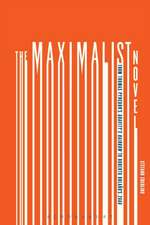The French Genealogy of the Beat Generation: Burroughs, Ginsberg and Kerouac's Appropriations of Modern Literature, from Rimbaud to Michaux
Autor Dr. Véronique Laneen Limba Engleză Hardback – 18 oct 2017
| Toate formatele și edițiile | Preț | Express |
|---|---|---|
| Paperback (1) | 231.42 lei 6-8 săpt. | |
| Bloomsbury Publishing – 17 apr 2019 | 231.42 lei 6-8 săpt. | |
| Hardback (1) | 774.20 lei 6-8 săpt. | |
| Bloomsbury Publishing – 18 oct 2017 | 774.20 lei 6-8 săpt. |
Preț: 774.20 lei
Preț vechi: 1113.15 lei
-30% Nou
Puncte Express: 1161
Preț estimativ în valută:
148.16€ • 153.80$ • 123.54£
148.16€ • 153.80$ • 123.54£
Carte tipărită la comandă
Livrare economică 22 martie-05 aprilie
Preluare comenzi: 021 569.72.76
Specificații
ISBN-13: 9781501325045
ISBN-10: 1501325043
Pagini: 280
Ilustrații: 18 b/w illustrations
Dimensiuni: 152 x 229 x 22 mm
Greutate: 0.54 kg
Editura: Bloomsbury Publishing
Colecția Bloomsbury Academic
Locul publicării:New York, United States
ISBN-10: 1501325043
Pagini: 280
Ilustrații: 18 b/w illustrations
Dimensiuni: 152 x 229 x 22 mm
Greutate: 0.54 kg
Editura: Bloomsbury Publishing
Colecția Bloomsbury Academic
Locul publicării:New York, United States
Caracteristici
Offers a genuine comparative approach, proceeding from knowledge of both French and American modern traditions and challenging their respective criticism
Notă biografică
Véronique Lane is Lecturer in French and Comparative Literature at Lancaster University, UK. She has taught French critical thought on the Vassar-Wesleyan Program in Paris, France, and has been Assistant Professor of French at Wesleyan University, USA, as well as Postdoctoral Fellow in the Research Institute for the Humanities at Keele University, UK. She has a PhD on Artaud and Genet from the Université Paris Diderot - Paris VII.
Cuprins
List of FiguresAcknowledgmentsIntroduction: Beyond "Rimbaud in a raincoat"1. Burroughs or Kerouac's Rimbaud: To Be or Not To Be "L I T E R A R Y" 2. French Poetic Realist Film in Kerouac's Unknown Bookmovie3. Kerouac's Humanism: From Céline and Dostoevsky to Proust4. Burroughs' Queer Aesthetics: From Gide to Cocteau5. Looking Back on Ginsberg's "Howl" from "Apollinaire's Grave"6. The Pitfalls of Open Secrecy: "Has Nobody Noticed" St.-John Perse?7. Burroughs' (Anti)humanism: Saint Genet and the Last Lifeboat8. Burroughs, Michaux, and the Future of LiteratureConclusion: A Purloined GenealogyBibliographyNotesIndex
Recenzii
The first and most thorough book-length attempt to rectify [a] disciplinary blind-spot by uncovering the major Beat Generation writers' multi-faceted appropriations of French literary antecedents. From a Francophone perspective, but with a comparativist's sensibility for nuanced readings of translingual and cross-cultural literary appropriation, Lane's essays tackle both the infamous and the forgotten works of Jack Kerouac, Allen Ginsberg, and William S. Burroughs . Through her genealogical, archaeological, and inter-textual approach, Lane's startling, at times haunting, juxtapositions reveal the vibrant and diverse evolution of transatlantic cultural networks across a constellation of slippery texts and subversive artworks . In her genealogy of the French roots of the Beat Generation's rhizomatic outgrowths, Véronique Lane's The French Genealogy of the Beat Generation offers an entertaining and erudite invitation to explore the transcultural appropriations that generated America's most subversive and marginalized literature.
Lane's groundbreaking study ... is replete with original and perceptive comparative close readings that will appeal to French as well as Beat literature specialists.
Véronique Lane's The French Genealogy of the Beat Generation fills an important and often unacknowledged gap in the study of these seemingly echt-American rebels. The Beats' literary Frenchness is more than an artifact of their time-it is a key to their literary values and a measure of the tradition of literary revolt that spread from 19th-century France across continents and centuries. Lane elucidates the connections with wit, grace, and style.
Lane has written a pearl of a book, illuminating a central aspect of Beat literature that's long been obscure.
This timely and informative book establishes the importance of French writers for the Beat generation of writers so effortlessly and convincingly that one can only wonder why it has never been done before. Deploying an intimate grasp of the works of Burroughs, Ginsberg and Kerouac based on detailed textual analysis, this ambitious study is sure to be a reference-point for many years to come.
Véronique Lane's informed close readings succeed in showing that French Modernity was much more than a mere influence for the major Beat authors. While clarifying their relations to the works of Rimbaud, of Cocteau, but also of Saint-John Perse and Michaux or the cinema of Carné, this study revives in unexpected ways the poetic project, embraced by both the American and French traditions it investigates, of changing our idea of mankind. A book that ought to be read on both sides of the Atlantic.
Lane's groundbreaking study ... is replete with original and perceptive comparative close readings that will appeal to French as well as Beat literature specialists.
Véronique Lane's The French Genealogy of the Beat Generation fills an important and often unacknowledged gap in the study of these seemingly echt-American rebels. The Beats' literary Frenchness is more than an artifact of their time-it is a key to their literary values and a measure of the tradition of literary revolt that spread from 19th-century France across continents and centuries. Lane elucidates the connections with wit, grace, and style.
Lane has written a pearl of a book, illuminating a central aspect of Beat literature that's long been obscure.
This timely and informative book establishes the importance of French writers for the Beat generation of writers so effortlessly and convincingly that one can only wonder why it has never been done before. Deploying an intimate grasp of the works of Burroughs, Ginsberg and Kerouac based on detailed textual analysis, this ambitious study is sure to be a reference-point for many years to come.
Véronique Lane's informed close readings succeed in showing that French Modernity was much more than a mere influence for the major Beat authors. While clarifying their relations to the works of Rimbaud, of Cocteau, but also of Saint-John Perse and Michaux or the cinema of Carné, this study revives in unexpected ways the poetic project, embraced by both the American and French traditions it investigates, of changing our idea of mankind. A book that ought to be read on both sides of the Atlantic.














